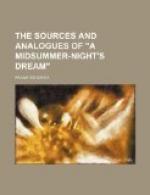* * * * *
To William Churne of Staffordshire
Give laud and praises due,
Who every meal can mend your cheer
With tales both old and true:
To William all give audience,
And pray ye for his noddle:
For all the fairies evidence
Were lost, if it were addle.
RICHARD CORBET
(1582-1625),
from
Poetica Stromata (1648)
* * * * *
THE FAIRY QUEEN
Come, follow,
follow me,
You fairy elves
that be,
Which circle on
the green,
Come follow me
your queen;
Hand in hand let’s dance around,
For this place is fairy ground.
When mortals are
at rest,
And snorting in
their nest,
Unheard and unespied
Through keyholes
we do glide:
Over tables, stools, and shelves.
We trip it with our fairy elves.
And if the house
be foul,
Or platter, dish,
or bowl,
Upstairs we nimbly
creep
And find the sluts
asleep;
There we pinch their arms and thighs;
None escapes nor none espies.
But if the house
be swept,
And from uncleanness
kept,
We praise the
household maid
And surely she
is paid;
For we do use, before we go,
To drop a tester in her shoe.
Upon a mushroom’s
head
Our table we do
spread;
A corn of rye
or wheat
Is manchet which
we eat,
Pearly drops of dew we drink
In acorn cups filled to the brink.
The brains of
nightingales
With unctuous
dew of snails
Between two nutshells
stewed
Is meat that’s
easily chewed;
And the beards of little mice
Do make a feast of wondrous price.
On tops of dewy
grass
So nimbly do we
pass,
The young and
tender stalk
Ne’er bends
when we do walk;
Yet in the morning may be seen
Where we the night before have been.
The grasshopper and fly
Serve for our minstrelsy.
Grace said, we dance awhile,
And so the time beguile;
And when the moon doth hide her head,
The glow-worm lights us home to bed.
From The Mysteries of
Love and
Eloquence (1658); with a preface
signed E[dward] P[hillips].
* * * * *
NYMPHIDIA:
THE COURT OF FAIRY
Old Chaucer doth of Topas tell,
Mad Rab’lais of Pantagruel,
A later third of Dowsabel,
With such poor trifles playing;
Others the like have laboured at,
Some of this thing and some of that,
And many of they know not what,
But that they must be saying.




